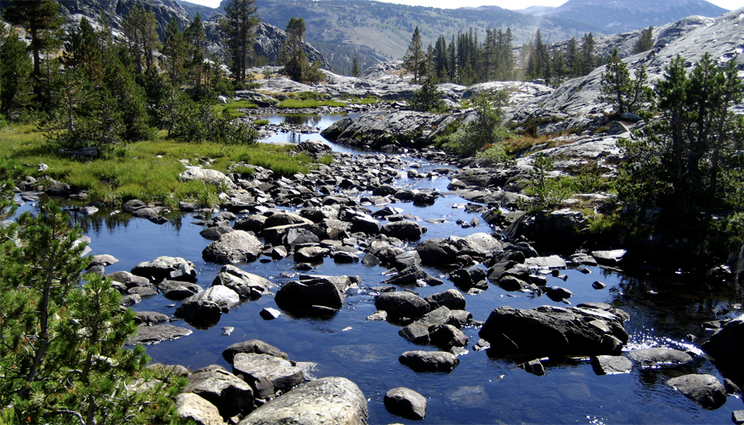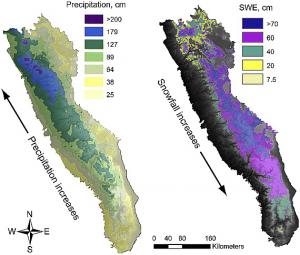Project to study climate effects on California water systems from headwaters to groundwater
 (Download Image)
A new project by national laboratories and University of California campuses will study California’s water systems, from the headwaters in the Sierra Nevada, through rivers, reservoirs and groundwater in the Central Valley. Pictured here is the headwaters of the San Joaquin River.
(Download Image)
A new project by national laboratories and University of California campuses will study California’s water systems, from the headwaters in the Sierra Nevada, through rivers, reservoirs and groundwater in the Central Valley. Pictured here is the headwaters of the San Joaquin River.
To address future climate change effects on water resources, scientists at five UC campuses, and Lawrence Livermore and Lawrence Berkeley national laboratories will study California’s water systems, from the headwaters in the Sierra Nevada, through rivers, reservoirs and groundwater in the Central Valley.
The "Headwaters to groundwate resources in a changing climate" project recently received a 2018 Collaborative Research and Training Award from the UC Laboratory Fees Research Program.
The project will allow scientists to examine hydrologic sensitivities of California headwaters and agricultural demand to changing climate and will consider plausible societal adaptations. The team will use information in the historical record and its interaction with physical characteristics of the basins and strategies for water management as precipitation varies, temperatures warm and population grows.
"The structure of California’s water system – both natural and man-made – shapes current and future management and adaptation options to climate change and to the increasing demand from a growing population," said Ate Visser, LLNL’s lead on the project,
The project integrates study of the climate, hydrology, ecosystems, energy and society influencing future water management, specifically focusing on aquifer storage and recovery in an adaptive framework. The goal is to provide information to optimize water storage, quality and groundwater sustainability.
Four river systems across gradients of precipitation, geology and populations will be under investigation: Shasta River in the north, American and Cosumnes rivers in central California and Kings river in the south. These river basins span a range of different characteristics in terms of temperature, precipitation, underlying geology, vegetation and ecosystems, land management, groundwater resources and economic development. The project builds on prior expertise in these basins and enables the team of researchers to make comparative analyses.
"The changing climate and growing population of California force us to rethink how we manage our water resources," Visser said. "The strength of this project is that it integrates natural and socio-economic sciences to provide a new knowledge base for future water management."
The research will address six key uncertainties and uncertain responses:
- Trends and variability in a future that likely experiences a greater fraction of precipitation as rain instead of snow, earlier snowmelt and higher rates of evapotranspiration.
- Response of ecosystems to changing quantity and timing of water supply, and feedback on precipitation, evapotranspiration and the overall water balance.
- Response of headwater catchments and uncertainty in future river discharge characteristics.
- Storage and use of water in the subsurface, considering efficiency of storage and recharge and energy requirements for recovery.
- Responses of water and agricultural management agencies and other institutions to changing supply and demand, including management of water markets to both agricultural and urban users.
- Resolution of the effect of uncertainties themselves on abilities to manage water for multiple objectives and adaptation to changes in supply and demand.
Related Links
UC National Laboratory Fees Research ProgramTags
Physical and Life SciencesFeatured Articles








